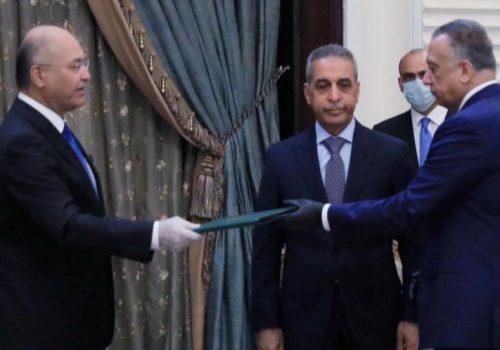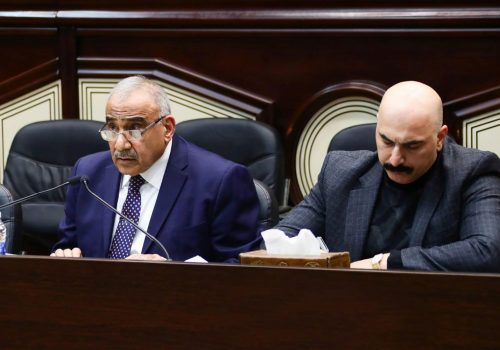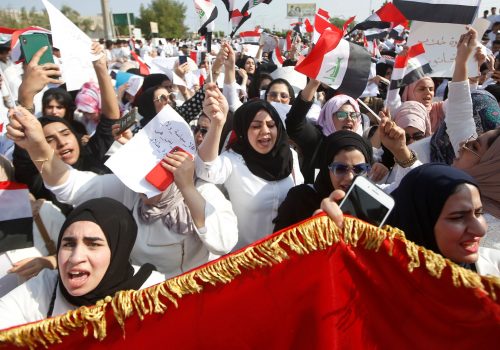New Iraqi government must face a pandemic and oil price drop
After six months of political stalemate and two aborted attempts, the Iraqi Council of Representatives voted on May 6 to confirm Prime Minister Mustafa al-Kadhimi and his proposed cabinet. They replaced the government of Prime Minister Adil Abdul-Mahdi, who resigned on November 2, 2019. The new government is expected to finish the outgoing government’s term, which ends in 2022. The Council of Representatives voted on nominees to head fifteen ministries, including the ministries of defense and interior, which is a break from the past. Previously, defense and interior ministers were not selected during initial cabinet confirmations. Four ministers were also rejected and the vote to confirm the oil and foreign affairs ministers was postponed.
Some Iraqis desire an early election and Prime Minister al-Kadhimi included that in his government program, but this is easier said than done. The new government will be necessarily preoccupied with greater challenges than organizing a snap election. Iraq, like most of the world, must respond to the COVID-19 pandemic, but with much lower levels of preparedness and a large deficit in medical and financial resources. This global threat is occurring along with another—the sharp decrease in the price of oil, which accounts for more than ninety percent of Iraq’s revenues. If the current oil price trend continues through 2020 and beyond, Iraq’s government will not be able to survive politically nor economically. Therefore, the government must focus on this dire situation and prioritize quick cross-sector economic measures. This is a more urgent endeavor than a snap election that would only be held to introduce another government before the second half of 2021, at best—a few months before the next scheduled elections.
With the decision to postpone the choice about the minister of oil, Iraq’s Council of Representatives have placed Baghdad in a perilous situation. The current oil crisis is affecting all oil producers, but Iraq is one of the most vulnerable countries because of its total dependence on oil revenues. Prime Minister al-Kadhimi needs to select a competent minister to manage this essential portfolio and navigate this crisis.
The Council of Representatives also failed to confirm the minister of foreign affairs. This vacancy will make it challenging for al-Kadhimi’s government to secure good standing regionally and internationally. Most importantly, the new government will not be ready for the fast approaching date for the US-Iraq Strategic Dialogue—scheduled for June 10, 2020—nor meeting the high expectations of both sides for a positive restructuring of bilateral relations. The absence of a minister of foreign affairs will place all the burden on the prime minister to prepare for the talks and set the agenda. Holding the talks under these asymmetrical conditions would ensure an unsatisfactory outcome. Iraqi politicians do not have a consensus on what can be accomplished from this round of talks and what endgame should be sought. A government with a diplomatic gap in its formation will only exacerbate the problems.
Like the two previous prime minister nominees, al-Kadhimi faced a trying battle with various Shia blocs who objected to his appointment. Some of the objections were related to his political and professional history, including concerns that he is “too friendly” with the United States. Other blocs objected to certain members of his proposed cabinet. The latter objections stemmed from dissatisfaction with the distribution of cabinet positions or the problematic background of some cabinet members. Iraq has no process in place to vet top office holders with robust background checks. Furthermore, the need to put together a list of ministers in a short time makes it hard to ensure the integrity and suitability of many candidates. This arbitrary process has produced many political scandals in all of the previous cabinets. Al-Kadhimi’s cabinet will be no exception and the insistence on submitting candidates simply to secure votes from political blocs that support or oppose them—despite their corruption and incompetence being common knowledge—is troubling. Prime ministers always face the choice between being rejected and being confirmed only to preside over an imperfect cabinet chosen for them by groups with competing interests.
That said, the formation of a fully authorized government is a welcome event. If nothing else, it provides a chance for Iraq to address its most pressing twin crises in the low oil prices and COVID-19. Additionally, it gives the opportunity for Iraq to heal the deep wounds in state-society relations, particularly, after the bloodshed following the crackdown on the protesters that occurred in the fall of 2019.
Dr. Abbas Kadhim is director of the Atlantic Council’s Iraq Initiative. Follow him on Twitter: @DrAbbasKadhim.
Image: Iraqi Prime Minister-designate Mustafa al-Kadhimi delivers a speech during the vote on the new government at the parliament headquarters in Baghdad, Iraq, May 7, 2020. Iraqi Parliament Media Office/Handout via REUTERS


